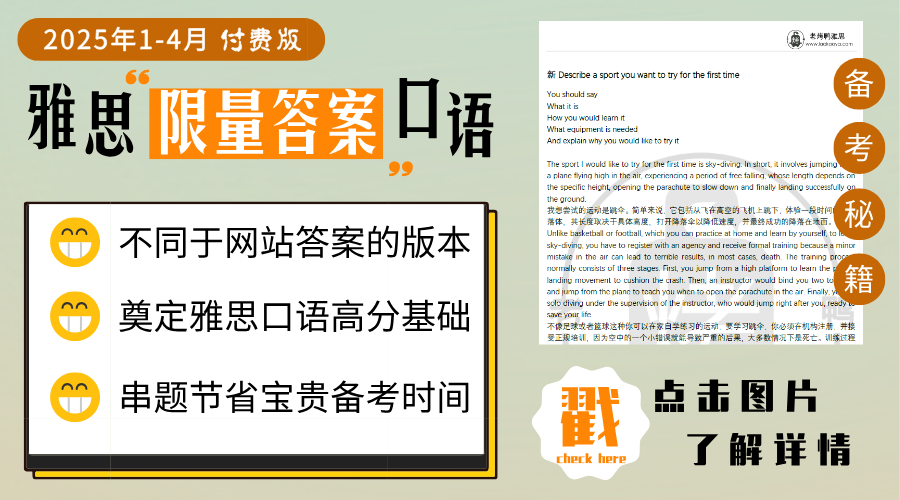剑桥雅思12Test8Section3听力原文与答案 presentation on film adaptations of Shakespeare’s plays
剑桥雅思12听力第8套题目第3部分的主题为莎士比亚戏剧改编。具体内容包括演讲的各个步骤,仍然需要完成的工作,以及对不同改编的评价。虽然讨论的内容比较新颖,但结构和本质仍然是课堂演讲的老一套。下面是这段录音对应的原文。
点击查看这篇雅思听力中需要大家掌握的重点词汇与具体题目的答案解析:
雅思备考听力篇 剑12 test 8 section 3 雅思听力高频词汇
剑桥雅思12Test8Section3听力答案解析 presentation on film adaptation of Shakespeare’s plays
剑桥雅思12 test8 section3雅思听力原文
KATIE: Joe, you know I’m giving a presentation in our film studies class next week?
JOE: Yes.
KATIE: Well, could we discuss it? I could do with getting someone else’s opinion.
JOE: Of course, Katie. What are you going to talk about?
KATIE: It’s about film adaptations of Shakespeare’s plays. I’ve got very interested in all the different approaches that film directors take.
JOE: Uhuh.
KATIE: So I thought I’d start with Giannetti, who’s a professor of film and literature. And in one of his books he came up with a straightforward classification (Q21) of film adaptations based on how faithful they are to the original plays and novels.
JOE: Right.
KATIE: I’ve already made some notes on that, so I just need to sort those out before the presentation. I thought that next I’d ask the class to come up with the worst (Q22) examples of Shakespeare adaptations that they’ve seen, and to say why. That should be more fun than having their favourite versions.
JOE: Yes, I can certainly think of a couple!
KATIE: Right. Next I want to talk about Rachel Malchow. I came across something on the internet about her work on film adaptations, and I was thinking of showing some film clips to illustrate her ideas.
JOE: Will you have enough time, though? Both to prepare and during the presentation? After all, I doubt if you’ll be able to find all the clips you want.
KATIE: Hmm. Perhaps you’re right. OK, well, I’d better do some slides (Q23) instead, saying how various films relate to what she says. That should encourage discussion.
JOE: Mmm.
KATIE: Next I want to say something about how plays may be chosen for adaptation because they’re concerned with issues (Q24) of the time when the film is made.
JOE: You mean things like patriotism, or the role of governments?
KATIE: Exactly. It’s quite tricky, but I’ve got a few ideas I’d like to discuss.
KATIE: And finally I want to talk about a few adaptations that I think illustrate a range of approaches, and make some comments on them. Do you know the Japanese film Ran?
JOE: I haven’t seen it. It was based on Shakespeare’s King Lear, wasn’t it?
KATIE: That’s right. It was a very loose adaptation, using the same situation and story, but moving it to 16th century Japan instead of 16th century Britain (Q25). So for example the king’s daughters become sons, because in Japanese culture at that time, women couldn’t succeed to the throne.
JOE: OK. I hope you’re going to talk about the 1993 film of Much Ado About Nothing. I think that’s one of the best Shakespeare films. It really brings the play to life, doesn’t it?
KATIE: Yes, I agree. And I think filming it in Italy, where the play is set, makes you see what life was like at the time of the play (Q26).
JOE: Absolutely. Right, what’s next?
KATIE: Er, next. I thought Romeo & Juliet, the 1996 film, which moves the action into the present day (Q27).
JOE: Yes, it worked really well, I thought — changing the two feuding families in the original to two competing business empires, even though they’re speaking in the English of the original play.
KATIE: You’d expect it would sound really bizarre, but I found I soon got used to it.
JOE: Me too.
KATIE: Then I thought I’d include a real Hollywood film, one that’s intended to appeal to a mass commercial audience.
JOE: There must be quite a number of those.
KATIE: Yes,but I’ve picked the 1996 film of Hamlet. It included every line of the text,but it’s more like a typical action hero movie (Q28)— there are loads of special effects, but no unifying interpretation of the play.
JOE: All show and no substance.
KATIE: Exactly. Then there’s Prospero’s Books, based on The Tempest. That was really innovative, from a stylistic point of view.
JOE: Didn’t it include dance and singing and animation as well as live actors (Q29).?
KATIE: Yes, it did. I also want to mention Looking for Richard. Did you ever see it?
JOE: No. But I’ve read about it. It was a blend of a documentary with a few scenes from Richard III, wasn’t it (Q30)?
KATIE: That’s right. It’s more a way of looking into how people nowadays connect with the playwright — the play is really just the starting point. And that’ll be where I finish.
JOE: Well, it sounds as though it’ll be very interesting.
剑桥雅思12 Test8 Section3雅思听力答案
21. classification
22. worst
23. slides
24. issues
25. F
26. A
27. E
28. C
29. G
30. B
剑桥雅思12Test8Section1听力原文与答案 cycle tour leader: applicant enquiry
剑桥雅思12Test8Section2听力原文与答案 visiting the sheepmarket area
剑桥雅思12Test8Section4听力原文与答案 Noise in Cities


